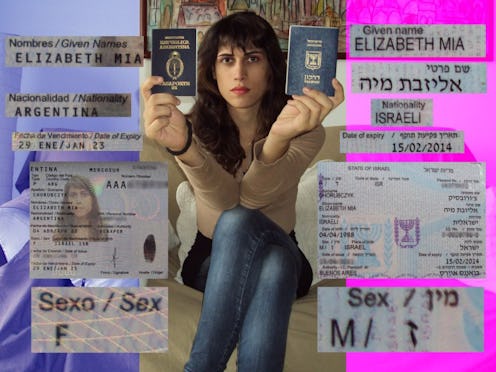News
Being Transgender In a Land Of Machismo

In addition to being a beautiful place, Argentina may also be one of the most LGBT-friendly countries in the world — on paper, that is. Its Gender Identity Law, passed in January 2012, enables citizens to change their names and government-sanctioned sex on official documents without the approval of a judge or doctor. The law is the only one of its kind.
But at a local level, Argentine people’s perceptions about trans individuals aren’t likely to change overnight. Machismo and homophobia are strong players in the cultural landscape of the country, and transgender media ridicule is common in Argentine TV shows.
According to Lohana Berkins, head of the office for gender identity and sexual orientation in Buenos Aires, the law still has constraints and limits. "We now have certain rights, but what is not guaranteed is our access to those rights," Berkins tells Bustle. "The law we defend and won will not change the structural environment, but it is an advance."
At 22, Argentine artist Elizabeth Beth, known as Effy, decided to transition towards a female identity. At 25, Effy makes performance art and graphic comics based on her daily experiences facing marginalization, hyper-sexualization, and job discrimination as a Latin American trans woman. She lives in the city of Buenos Aires and talked with Bustle about her experience.
How would you describe your life in Argentina since the gender identity law passed?
In my personal life, there was not a very highlighted before and after, because I have a double citizenship from both Argentina and Israel, where I was born. I had already changed my name to Elizabeth one year before, and was waiting for the law to be approved so that I could synchronize my Israeli ID with my Argentine one. I actually fell in a legal hole, and at first it felt like the law wouldn't apply to me. I started a lawsuit to achieve name recognition on my Argentine ID, so I got it months after the law was passed.
What still needs to change in Argentina?
Argentina is a vast country with a lot of diversity, and the law is in favor of trans individuals now, but [that is] very separate from the daily realities I experience. Having an ID that validates my name and gender does not exonerate me from mistreatment, marginalization, and invisibility both in the public sphere — or in the home or at work. Yes, the law turns us into subjects worthy of rights, but this is a paradigm shift that the majority of the Argentine population has yet to comprehend. To detach one’s genitalia from one’s gender identity, just as the law proposes, is a remote concept to many. At a socio-cultural level, it is urgent for Argentine media and educational institutions to rethink its discourses about trans groups, and its negative stereotypes.
Could you talk about your graphic comic TRANSita Rapido?
I wanted to illustrate my daily experiences in Buenos Aires as transgender, which came out as tragic and comic at the same time. There were times when just standing and observing how others respond to me gave me enough material to make a comic. Doing nothing but being myself already made the reader aware of what I wanted to express, denounce, or resist.
(Translation: Caution, Damaged Woman)
Could you talk about your performance project and public intervention Nunca serás mujer (“You will never be a woman”)?
When others found out about my decision to assume an identity as a woman, many people told me that I would never be a woman because I cannot menstruate. So, one year after I started hormone treatment, I decided to extract the same quantity of blood that I should have lost through menstruations. Between performances and photographic interventions, I created an intimate personal narrative of different experiences I went through during that first year of hormonal treatment. During my last menstruation performance when the project was finalizing I used the last dosage of blood to write in the mirror “I am always a woman.” (You can check out the project's blog here .)
Does the LGBTQ community in Buenos Aires have its own prejudices?
In any community where cisgender predominates, trans people are either excluded or included by the group who enjoys the most privilege. And that’s a problem. Also, I don’t think any sexual orientation, gender identity, or sexual condition guarantees that a person will be open-minded or free of prejudices. For example, in my comics, I illustrated the time when a gay man did not understand why I dress in women’s clothing if I also like women, and he suggested I see a therapist. According to him, bisexuality did not exist and is merely a stage of confusion.
What are your plans for 2014?
2013 was an important year for me. I received my new ID, moved out of my family’s house, and went through a surgery I am still recovering from. In 2014, I would like to travel to other places with my artwork and performances. The struggle continues when it comes to finding a job that won’t discriminate me. Having an ID does not relieve me from marginalization and, so far, every company I showed up to work at has never called me back after seeing me in person. Transphobia is just as alive here, even though laws are advancing, and my biggest difficulty consists in generating income to be able to eat and meet my basic needs.
Images: Effy Beth, effybeth.com